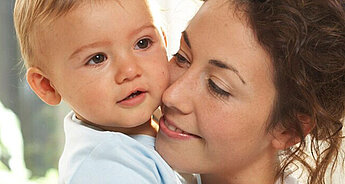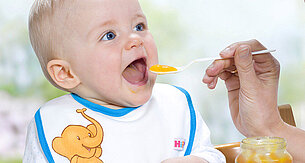A baby’s digestion: What should be done if stool is watery/soft?

An infant’s stool can vary strongly in colour, smell and consistency, depending on what the baby has been fed (breast milk, conventional milk formula, HA formula, weaning food) – just like with adults.
The classical breast milk stool is soft to watery. If a child is exclusively bottle-fed then, depending on the formula composition, the stool can be harder or similar to breast-fed infants’ stool. Our HiPP Combiotic® contains dietary fibres (galacto-oligosaccharides derived from lactose), for example, which loosen the stool and can therefore make it softer.
To make the stool firmer, the following tips can help (weaning food age)

- A choice can be made as to which foods are given
- Bananas and carrots are foods that can firm stool
- On our jars, by the list of ingredients you will find the note “stool firming”, Check how much fruit and juice is being consumed and restrict amounts if necessary
If the stool is watery and unpleasant smelling, and bowel movement takes place several times a day (more often than usual), then it is diarrhoea, and it is imperative that you visit a paediatrician. Diarrhoea should always be treated by a doctor. Only your paediatrician can determine the cause.
If your child is also vomiting and has a temperature, or seems in any way ill, then it is probably a gastrointestinal disorder, which occurs quite frequently in infancy and toddlerhood, and it is imperative that a paediatrician clarifies the situation.
If a child is suffering from diarrhoea and/or vomiting, large amounts of fluids and minerals (electrolytes) are lost in a short time. If these are not replaced, the child’s body can dehydrate rapidly.
The most important thing is to compensate the fluid and mineral loss. For this, doctors recommend so-called drinking solutions (oral rehydration solutions, ORS). They are available at every chemist.
HiPP also has a product for this called HiPP ORS Carrot and Rice-based Oral Rehydration Solution. The special composition allows the child’s body to be rapidly supplied with fluids and minerals again.



